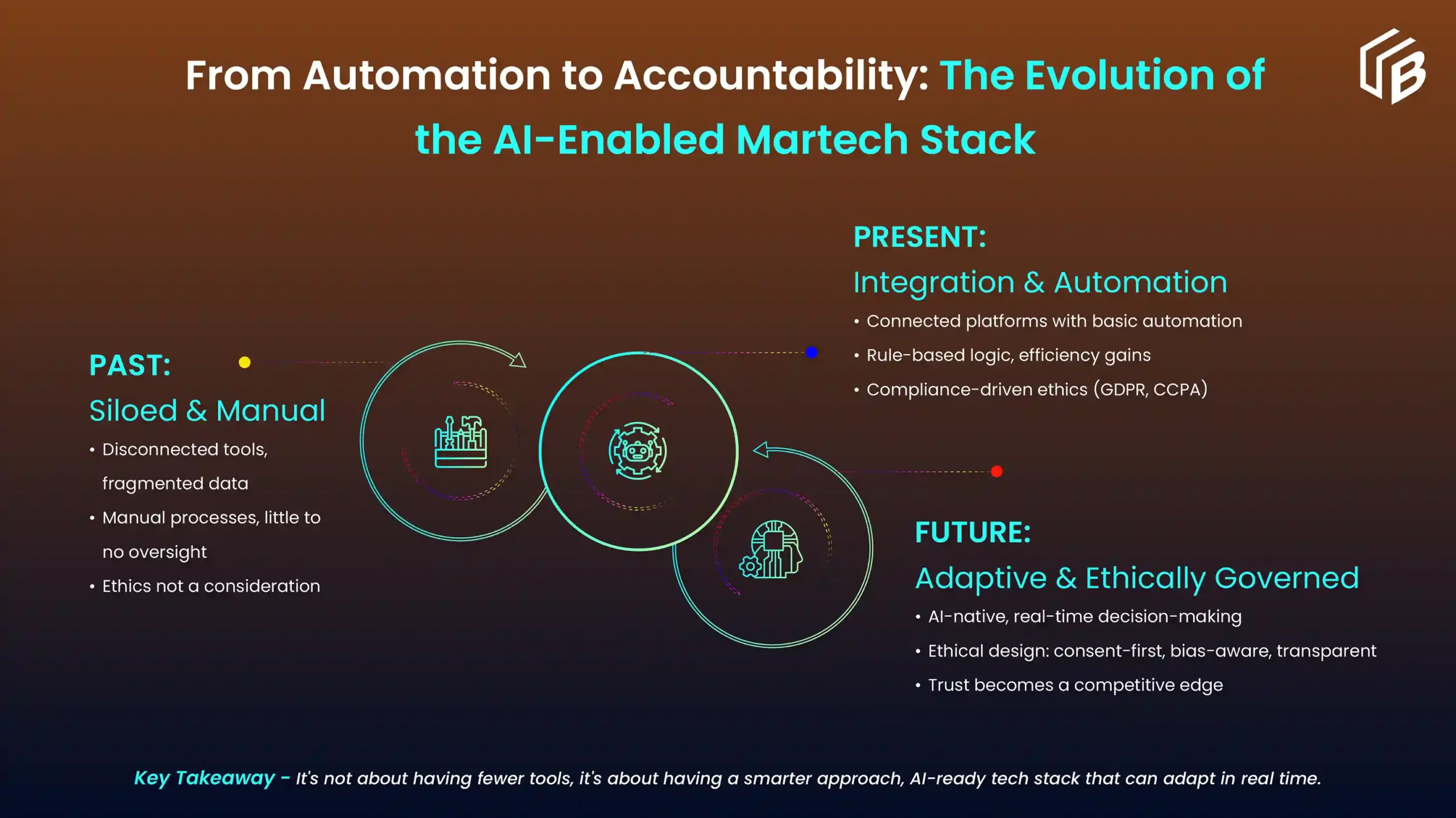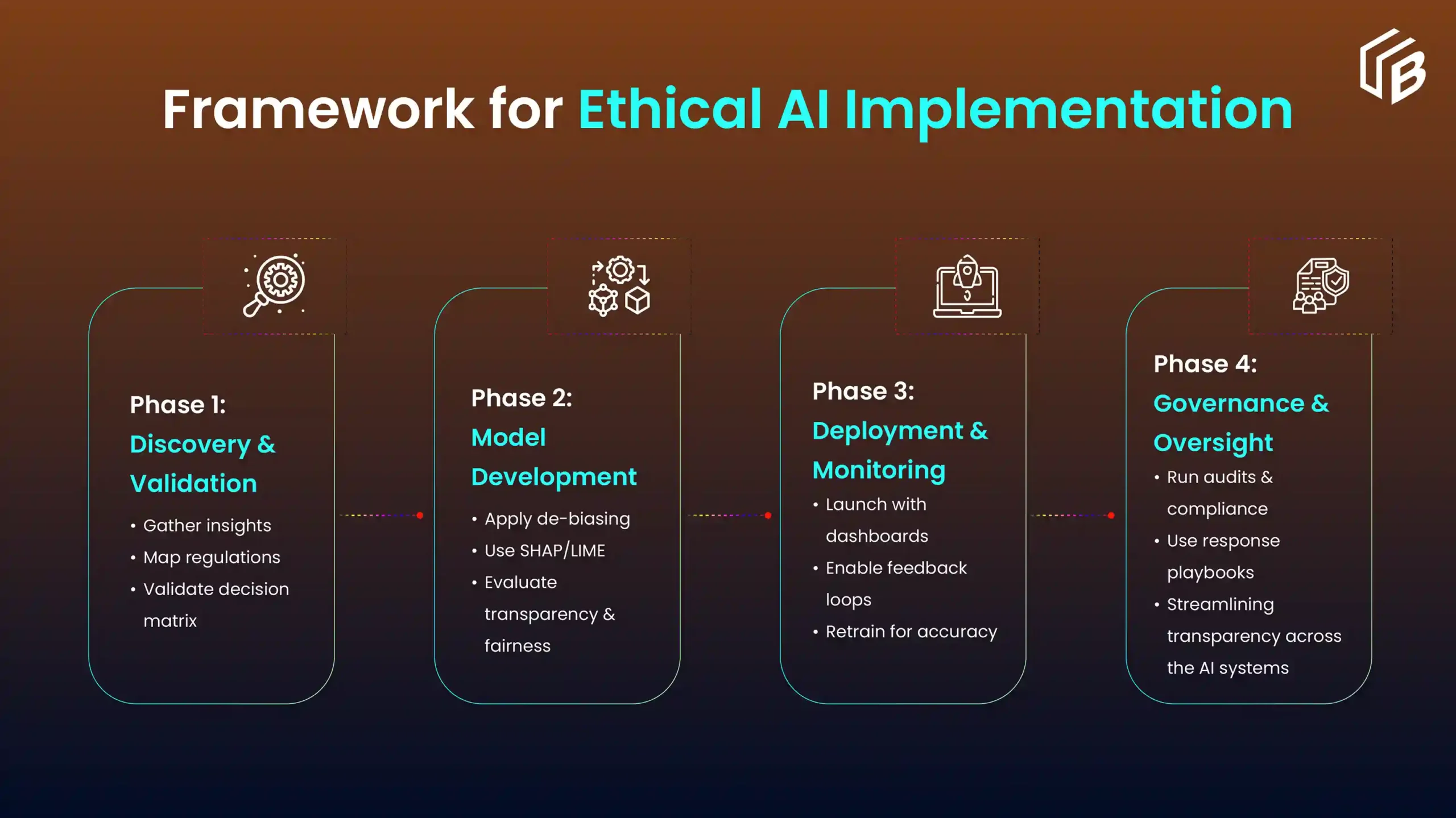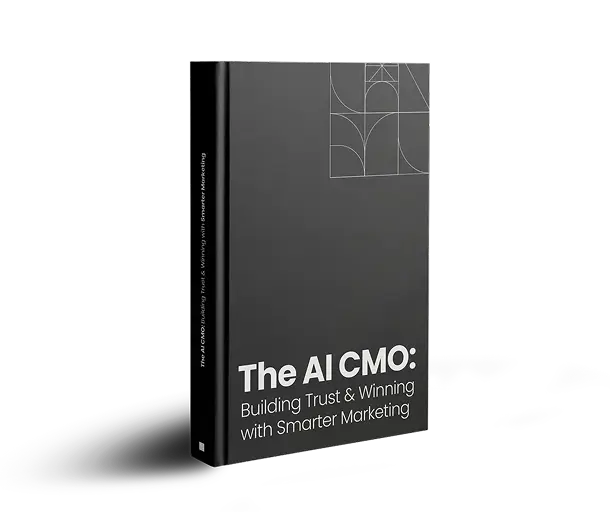Introduction
The age of AI-enabled marketing is no longer a future state, it’s the current reality. As AI adoption accelerates, so does the responsibility to use AI in ways that are transparent, fair, and trustworthy. That’s where ethical AI comes in.
Ethical AI refers to the responsible design, development, and deployment of artificial intelligence systems. It ensures that AI decisions are explainable, data use is compliant and respectful of privacy, and algorithms don’t reinforce bias or create unintended harm.
For CMOs, the stakes are high. You’re not just implementing powerful tools, you’re shaping how your brand interacts with customers at scale. Customers today care about how their data is used. Regulators are enforcing stricter compliance. And internal teams, from legal to IT, expect marketing leaders to align AI use with broader corporate values and governance.
CMOs who lead with ethics in AI adoption will be better positioned to build lasting customer trust, reduce risk, and future-proof their
marketing operations.
In short, ethical AI is about doing what’s smart for your brand, your buyers, and your bottom line.
The Paradigm Shift: From Tool Consolidation to Adaptive Integration
From what I have seen, many CMOs are still focused on tech consolidation, eliminating redundancies and streamlining for efficiency. And while operational simplicity is valuable, AI learning and development is changing the equation. Today, it’s not just about what tools you have, but how they integrate, share data, and evolve together.
Modern
martech stacks must now function as dynamic ecosystems, where data flows seamlessly across platforms, insights trigger immediate action, and every tool contributes to an integrated customer experience. The true value lies in systems that support ethical AI adoption in business—systems that adapt to AI, automate, and continuously optimize in alignment with both buyer behavior and business objectives.
The Ethical Challenges of AI in Marketing
New ethical challenges are surfacing as AI is moving forward, that require careful consideration from industry leaders. The power of AI to drive personalized experiences and data-driven decisions also brings with it a responsibility to ensure fairness, transparency, and privacy in how data is used.
While the benefits of AI are undeniable such as faster insights, smarter targeting, and automated content, there’s a growing tension between innovation and integrity. Ignoring the ethical challenges of AI isn’t just risky; it can erode trust, damage your brand, and lead to long-term reputational fallout.
1. AI-Driven Personalization vs. Privacy Concerns
AI enables marketers to deliver hyper-personalized experiences, but at what cost? Consumers are becoming increasingly aware of how much data is being collected, and questions around consent and transparency are rising.
Just because AI can predict what your buyer wants doesn’t mean it should act on that information without consent. Balancing this thin line between personalization and privacy is one of the biggest AI ethical issues marketers face today.
My advice to CMOs: prioritize data ethics and be transparent about how AI is used to tailor customer experiences.
2. Bias in AI Algorithms and Its Impact on Brand Reputation
Another critical issue is AI bias and ethics. AI models are only as objective as the data they’re trained on and that data often reflects historical human bias. Whether it’s gendered language in ad copy or skewed lead scoring based on demographics, unchecked bias in algorithms can alienate audiences and tarnish your brand’s image.
The ethical concerns for AI here are not just technical, they’re strategic. B2B brands must audit their AI tools regularly and involve diverse teams in model training and review.
3. Use of AI in Content Creation and the Rise of Deepfakes
AI-generated content is booming, and while it’s a productivity win, it also raises thorny questions about authenticity. In marketing, we’ve seen synthetic voices, AI-written articles, and even deep fake videos being used to create engaging campaigns. But if audiences feel manipulated or deceived, the backlash can be swift.
The ethical line here isn’t always clear, but transparency is key. Marketers should disclose when content is AI-generated and avoid tactics that blur the line between real and fabricated.
4. Data Sourcing and Consent Issues
Much of what powers AI is data often scraped, purchased, or inferred. But not all of it is ethically sourced or properly consented. When AI systems rely on data that users didn’t knowingly share, it creates a serious trust issue. Regulations like GDPR and CCPA are just the beginning.
In my experience, brands that embed data ethics into their AI strategy, from sourcing to segmentation are far better positioned for sustainable growth.
The Strategic Imperative: Why Continuous AI Learning Matters
Market Dynamics & AI Evolution
In my experience, the speed at which AI is evolving today is both exhilarating and overwhelming. Every time we turn around, we see rapid improvements in AI model capabilities, think LLMs,
generative AI, and predictive analytics, changing the game for B2B marketers. What was once a niche tool for automation is now a powerhouse, driving personalization, optimizing customer journeys, and even predicting future behaviors.
The real advantage comes from embracing these advancements early. Early AI adopters aren’t just keeping pace, they’re setting the pace. They’re the ones who are using AI to reimagine what’s possible, transforming their operations in ways that can’t be replicated overnight. On the flip side, those who don’t prioritize continuous AI learning risk falling behind, unable to compete with more agile, data-driven players. It’s not just about keeping up anymore, it’s about staying ahead.
Customer Expectations & Trust
Now, when we talk about customer expectations, we’re in a whole new era. From what I’ve seen, buyers expect more than just personalized experiences, they want interactions that respect their privacy and their data. From my perspective, AI and ethics are now inseparable. They’ve become more informed about how AI works, and many are demanding transparency from the brands they engage with.
If you’re not thinking about how to integrate privacy respecting and ethical AI practices into your strategy, you’re missing the point.
And here’s the thing, the stakes are higher than ever when it comes to trust. One misstep, whether it’s a data breach, an algorithmic error, or an unclear data usage policy, and you’ve lost your customer’s trust, potentially forever.
Trust is fragile. That’s why AI ethics in business is now a strategic mandate, not just a legal checkbox. In fact, ethical AI adoption is one of the clearest paths to long-term differentiation.
Building an Ethical AI Mindset
I believe it’s crucial to integrate ethics by design from the very beginning. For me, this means embedding fairness, transparency, and accountability into every AI-driven decision we make. Without this foundation, AI can quickly go off track.
Ethics by Design: Embedding Ethical Principles
Ethics in AI must be built into every layer of decision-making. This involves proactive steps to ensure fairness in algorithms, transparency in data usage, and accountability in decision-making.
Companies that are serious about AI governance and compliance are establishing ethics councils. To support this, cross-functional ethics review boards, consisting of data scientists, legal experts, and business leaders, can oversee projects, ensuring ethical standards are met at each stage.
Governance Structures: Ensuring Ongoing Accountability
Establishing clear governance structures is critical for maintaining ethical AI. An AI policy playbook should outline standards for data handling, bias mitigation, and auditing AI actions. Key roles such as the Chief AI Officer, Data Steward, and Ethics Champion ensure alignment with ethical goals and facilitate ongoing oversight.
Ethical Risk Assessment: Identifying and Mitigating Risks
Responsible AI practices in organizations require clear governance. This includes identifying potential ethical AI concerns in use cases like dynamic pricing or sentiment analysis, ensuring safeguards are in place to avoid harmful outcomes. Understanding risks upfront allows businesses to implement strategies that protect both their brand and customers.
Continuous Monitoring: Measuring Ethical Impact
Continuous monitoring ensures AI remains fair, transparent, and accountable over time. Establishing KPIs for fairness, privacy, and explainability allows companies to track performance and address any ethical issues as they arise. Regular audits and transparency in decision-making ensure AI systems continue to align with organizational values.
Framework for Ethical AI Implementation in Marketing
As AI becomes more embedded in marketing, implementing ethical guidelines is crucial to building trust and ensuring fairness. Here’s a framework for AI integration that emphasizes ethics from discovery to continuous oversight.
Phase 1: Discovery & Use-Case Validation
It’s a fact that understanding your stakeholders’ needs and the regulatory landscape is essential for laying the groundwork. This phase involves stakeholder interviews, data audits, and mapping out the regulatory environment. So far, creating an ethical checklist and a go/no-go decision matrix has proven effective in validating AI use cases, ensuring alignment with fairness and transparency.
Phase 2: AI Model Development & Bias Mitigation
During AI model development, data sourcing standards and de-biasing techniques play a crucial role in mitigating biases. Interpretability tools like SHAP and LIME are used in campaign analytics to enhance transparency and ensure the AI’s decisions are justifiable. Many more techniques, such as fairness evaluations, are implemented to refine the models and reduce bias.
Phase 3: Deployment & Performance Monitoring
When deploying AI models, real-time dashboards track ethical metrics such as demographic parity and privacy incidents. Feedback loops for user reporting trigger automatic model retraining, ensuring continuous improvements. So far, this approach has proven to enhance both performance and ethical accountability.
Phase 4: Governance & Continuous Oversight
Ongoing governance ensures compliance and ethical alignment. Regular audits and compliance reviews help identify areas for improvement. Incident response playbooks are created for quick resolution, and transparent disclosure practices ensure stakeholders remain informed about AI operations. It is for a fact that continuous oversight fosters trust and maintains the integrity of AI systems.
Measuring the Success: KPIs for Ethical AI Adoption
Beyond driving efficiency and performance,
AI in B2B marketing must also be held to ethical benchmarks. These KPIs are designed to assess both responsible AI use and measurable business results:
Ethical Performance Indicators
- Bias Reduction Rates: Monitor progress in reducing biases in AI models to ensure fairness across demographics.
- Transparency Scores: Assess the clarity of AI decision-making processes, with higher scores indicating greater trust and understanding.
- Privacy-Compliance Incidents: Track any incidents where AI systems violate data privacy regulations, aiming for zero occurrences.
Business Impact Metrics
- Conversion Lift: Measure increases in conversions from AI-driven campaigns, indicating effectiveness.
- Customer Satisfaction (CSAT): Track customer satisfaction with AI interactions, which reflects overall experience quality.
- Net Promoter Score (NPS): A key metric that assesses customer willingness to recommend your brand, serving as a strong indicator of satisfaction and trust in your AI-driven experiences.
Learning & Adaptation Metrics
- Number of AI Experiments Run: Count the AI-driven experiments to gauge continuous testing and optimization.
- Cross-Team Skill Certifications: Track the number of team members trained in ethical AI practices.
- Time-to-Market Improvements: Evaluate how AI reduces time-to-market, reflecting efficiency and adaptability.
Roadmap & Action Plan for CMOs
Short-Term (0–6 Months): Laying the Foundation
In my experience, the first 6 months should focus on setting the groundwork for responsible AI adoption.
- Launch an AI Ethics Task Force: My advice to CMOs is to assemble a cross-functional team to create ethical guidelines for AI. This team will ensure AI aligns with privacy, fairness, and brand values.
- Pilot 2–3 Use Cases with Ethical Guardrails: Start with a few controlled AI use cases, like personalized content or predictive lead scoring. Measure both performance and ethical compliance during these pilots.
Mid-Term (6–18 Months): Scaling and Integration
The next 6–18 months should be about scaling AI and making ethics a part of everyday business operations.
- Scale Your AI Innovation Hub: I recommend creating a dedicated space for AI experimentation. This will help develop new strategies and tools while keeping ethical standards top of mind.
- Integrate Ethics Metrics into Executive Dashboards: Make AI ethics visible by adding ethical performance indicators to your executive dashboards. This ensures leadership stays focused on responsible AI.
Long-Term (18+ Months): Continuous Evolution and Industry Leadership
Looking ahead, 18+ months is about embedding AI ethics deeply into your culture and becoming an industry leader.
- Embed Continuous Learning in Performance Goals: My advice is to make ethical learning a part of team goals. Regular training ensures your AI practices evolve responsibly. An enterprise must adapt AI responsibly.
- Lead Industry Consortiums on Responsible AI: Position your company as a thought leader by joining or creating industry groups focused on responsible AI. This helps set standards and build your brand’s reputation as a responsible innovator.
Final Thoughts
In my experience, the most impactful AI-driven marketing transformations are rooted in three essentials: continuous learning, ethical discipline, and a bold commitment to innovation. As AI reshapes how we connect with buyers and drive results, the role of the CMO is evolving into one of strategic orchestration and responsible leadership.
Align your executive team around a clear and ambitious AI vision. Ensure that resources are intentionally allocated to build both capability and confidence across your teams. And most importantly, communicate your plan consistently and transparently to all key stakeholders.
The future won’t wait. The brands that lead will be the ones that put AI ethics at the core of how they grow.
This mindset is what separates brands that experiment with AI from those that lead with it. The future of marketing belongs to those who build with purpose and adapt with integrity.












